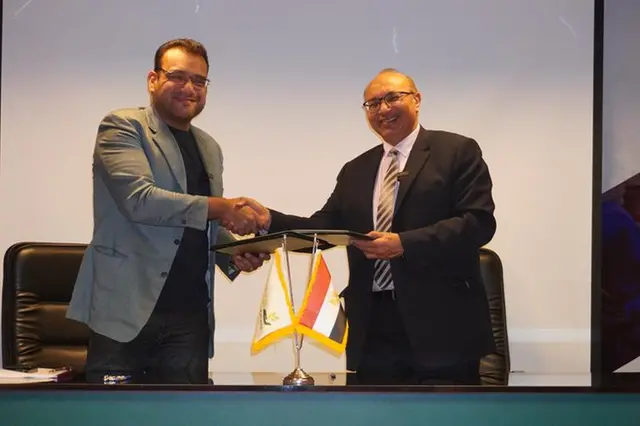The Egyptian Food Bank has announced the signing of a Memorandum of Understanding (MoU) with the Egyptian Academy of Bone Health.
Through the MoU, signed by Mohsen Sarhan, CEO of the Egyptian Food Bank, and Prof. Dr Yasser El Miedany, President of the Egyptian Academy of Bone Health, the two are launching a new program titled “Vitamin D” aimed at reducing bone fragility and minimising the risk of fractures.
The program is set to run for two years, from January 2024 to December 2025, to be extended based on the results achieved during the initial period.
This is in line with the Egyptian Food Bank’s strategy, which depends on designing interventions based on research and scientific evidence.
The project is designed to mitigate bone-related injuries and reduce the risk of fractures in individuals aged 50 and above, outperforming traditional fracture rates within this demographic.
The Egyptian Food Bank, in collaboration with the Egyptian Academy of Bone Health, will implement the project targeting senior residents in elderly homes affiliated with the Ministry of Social Solidarity.
The project will see the Egyptian Food Bank delivering monthly food packages to elderly homes, specifically designed to address the nutritional requirements of seniors, focusing on Vitamin D and calcium to alleviate bone fragility and lower the risk of fractures.
Recipients will also be provided with recipes for crafting wholesome meals abundant in calcium and Vitamin D, featuring ingredients such as tuna, oily fish, and milk.
The objective here, it shared, is to boost their Vitamin D levels by 30 per cent and enhance their calcium levels by 25 per cent.
The program’s initiation is based on official statistics from 2022, revealing that there are approximately seven million citizens above 60 in Egypt, among the demographics most susceptible to various health and social issues. This includes undetected bone fragility, a prevalent and impactful health challenge for older people.
The collaboration between the Egyptian Food Bank and the Egyptian Academy of Bone Health seeks to execute the program across ten elderly homes, reducing the damages caused by bone fragility, as this is a condition which often lacks visible symptoms in seniors and is frequently only discovered when fractures occur. This can lead to significant mobility impairment and affect the individual’s quality of life.
The two highlighted the crucial nature of the initiative, considering data reveals that 25 per cent of older people worldwide experience a death rate within one year of hip or spinal fractures.
The Egyptian Food Bank intends to complement existing services, including supervised physical activities under the guidance of the Egyptian Academy of Bone Health, and encourage seniors to benefit from sunlight exposure to stimulate vitamin D synthesis.
It is also exploring collaborations with the private sector to provide appropriate screenings and nutritional supplements for the targeted demographic.
“Our comprehensive strategy at the Egyptian Food Bank encompasses several pillars, and the ‘Vitamin D’ program falls within the prevention pillar, as we believe that prevention stands as a pivotal foundation in mitigating diseases and health risks across diverse age groups,” commented Mohsen Sarhan, CEO of the Egyptian Food Bank.
“Our project strategically focuses on Greater Cairo as part of our unwavering commitment to the well-being of seniors, particularly under the prevention pillar. With a primary focus on enhancing their quality of life and safeguarding against health risks such as bone fragility and life-threatening fractures, this comprehensive intervention incorporates involves medical and nutritional support, raising awareness about the importance of proper nutrition for seniors, and promoting outdoor exposure to sunlight and suitable physical activities. Furthermore, we highlight our strategic engagement with the respected Egyptian Academy of Bone Health—a critical alliance that considerably strengthens the Egyptian Food Bank’s programs,” Sarhan added.




